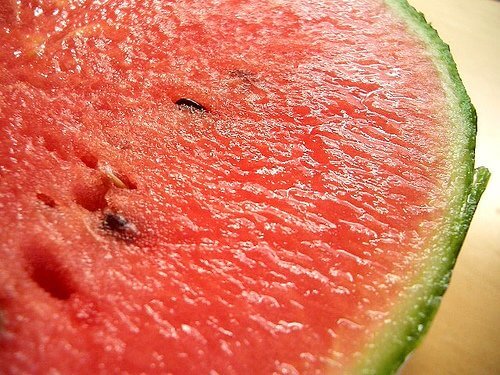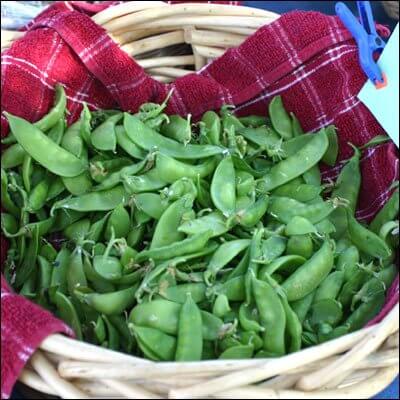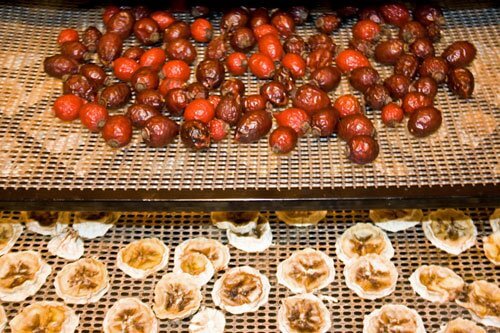Real Food on a Real Budget: Eat Local, Eat Seasonal

This is the last of the excerpts from my new book, Real Food on a Real Budget. It was taken from Chapter 7- Eat Local, Eat Seasonal. This month one of the topics here at Keeper of the Home is local and seasonal food, so this seemed a fitting topic to share!
*******
In one of my favorite reads this past year, Animal, Vegetable, Miracle by Barbara Kingsolver, she explains the concept of seasonality through a little creation she calls the “Vegetannual.” This incredible (yet completely imaginary) plant is intended to demonstrate the seasonal cycle of vegetable production over the course of the year.
It begins with crisp greens and asparagus in early spring, moves on to the peas, cabbages and cauliflower of later spring. Early summer finds the beginning of summer squash and cucumbers, which as the summer progresses have given way to glorious, plump tomatoes and mouth-watering melons. Late summer we see the arrival of corn and potatoes, and then as fall begins its triumphal entrance, we find winter squash and root vegetables in abundance, ready to see us through the winter.
“Some minor deviations and a bit of overlap are allowed, but in general, picturing an imaginary vegetannual plant is a pretty reliable guide to what will be in season, wherever you live. If you find yourself eating a watermelon in April, you can count back three months and imagine a place warm enough in January for this plant have launched it’s destiny. Mexico maybe, or southern California. Chile is also a possibility. If you’re inclined to think this way, consider what it took to transport a finicky fruit the size of a human toddler to your door, from that locale.
Our gardening forebears meant watermelon to be the juicy, barefoot taste of a hot summer’s end, just as pumpkin is the trademark fruit of late October. Most of us accept the latter and limit our jack-o-lantern activities to the proper botanical season. Waiting for a watermelon is harder. It’s tempting to reach for melons, red peppers, tomatoes, and other late-summer delights before the summer even arrives. But it’s actually possible to wait, celebrating each season when it comes, not fretting about its being absent at all other times because something else good is at hand.
If many of us would view this style of eating as deprivation, that’s only because we’ve grown accustomed to the botanically outrageous condition of having everything, always.”
Barbara Kingsolver, Animal, Vegetable, Miracle, pg. 65.
A few years ago I was ignorant to this cycle of plant life and food production. I did not understand that the supermarket tomatoes in March and the melons in December were just simply not the way that food really grows. Nor did I appreciate the difference to be had between foods that were grown out of season and transported thousands of miles for my convenience, compared to those that were grown in season and picked at their peak of ripeness and perfection.

Image by La Grande Farmer’s Market
I have come to not only appreciate, but greatly anticipate the arrival of each new season and the produce that it brings. This spring found me eager to savour fresh asparagus and to make salads out of my own garden greens. By summer I was absolutely longing for delicious berries right off the bush, and scrumptious dinners including zucchini, cherry tomatoes and basil straight from my garden.
We’re now in the midst of corn season as I write this chapter and it’s challenging for me to pass by a roadside stand without purchasing any for dinner that week, or to go for a walk in the park without taking twice as long due to stopping to pick almost every single ripe blackberry I see. I watch my neighbour’s apple tree with great expectation, knowing that later this month those apples will be crisp and sweet and mine for the picking. Three cheers for neighbours who don’t want to harvest their own fruit trees.
So how does this all tie in with the fact that we are after food that is not only whole and nourishing, but frugal as well? It’s fairly obvious that seasonal produce has many perks: it is fresher, tastier, contains higher nutrients (because it hasn’t traveled long distances during which its nutrients were lost), and it is a truly wonderful and beneficial thing to support what is being locally produced each season.
Beyond that, though, buying and eating seasonally has many benefits for your pocketbook as well! Food that has not had to travel long distances and is ripe and in abundance quite often comes at a much cheaper price than foods that are not in season. There is a real cost to food transportation and storage, and we pay that cost with our food dollars when we buy based on what we feel like eating, rather than what’s seasonally available to us.
Want to learn more about knowing what’s in season and how to find local/seasonal deals? Purchase the book Real Food on a Real Budget!





absolutely! I’ve been trying to eat locally / in season for almost a year now as part of my blog project. I have a new appreciation for buying vegetables from the side of the road LOL. I’ve also discovered that if I have patience, the price does come down for asparagus at the farmer’s market . . . the first week or two is always expensive (although still way cheaper than buying processed food from the store!).
Love this post.
.-= Wendy (The Local Cook)´s last blog ..Rhubarb Sauce =-.
I’ve recently started purchasing directly from my local natural foods distributor – – Regional Access in Ithaca, NY. It’s slightly cheaper than ordering through the local co-op (even with the extra gas needed to drive the additional distance), and instead of prepaying and then waiting weeks while they get my order in, I can pick up and pay all at once. There is a minimum order of $50 for warehouse pick-up, but with the purchase of just 25 lbs. of rice and 50 lbs. of wheat berries that’s easy to meet! For me, the bonus of purchasing from this particular distributor is that much of what they carry is locally grown or produced.
Another option… Any Amish or Mennonite communities in your area? They often have lovely “general stores” where you can purchase bulk quantities of all sorts of things – – spices, baking items, cheeses, snack foods, condiments, etc. The prices are usually quite reasonable and you don’t have all the waste of purchasing prepackaged foods. They often carry many natural products too!
I wish you had posted photos of foods that are in season now… Because my mouth is watering at the sight of sugar snap peas and watermelon! 🙂
We’re working on seasonal eating more and more. I think preservation is the key to living on a seasonal diet. I was able to enjoy cucumbers this week thanks to having preserved them at the end of last season. Without preservation, we northerners (I’m in MN) couldn’t make it!
.-= Amanda Ginn´s last blog ..Completely Pro-Life: Guest Writer =-.
@Amanda Ginn, LOL, I didn’t think about that! I just posted foods that were mentioned in the post! 🙂 But, peas are coming soon… mine are about to flower in my garden!
@Stephanie @ Keeper of the Home, My peas are sprouting, too! 🙂 Yum. Love those spring peas.
.-= Michele @ Frugal Granola´s last blog ..Journey of Blessing Series: Longing =-.
I also loved Animal, Vegetable, Miracle! I started reading it in January and immediately became one of the crazy customers at the farmer’s market every weekend even when it was barely above freezing. I feel like I’ve become a better cook by (mostly) cooking with whatever I find at the market each week instead of trying to make a shopping list based on pre-determined recipes. Your book also looks great, thanks for sharing the excerpts!
.-= Sarah´s last blog ..IKEA’s Never Ending List =-.
For the past 20 or more years, ever since vegetables and fruits at the grocery store stopped paying attention to seasons, I feel a deep unease when I walk into those stores and see blueberries in March or strawberries in September. I’ve tried to teach my children about the seasonal nature of fruits and veggies, but the evidence of their eyes hits a deeper part of the brain, and they’ve had trouble learning what is really fresh and when.
.-= Xan´s last blog ..Feng Shui in the Garden =-.
I agree with Amanda, that watermelon pic is making my mouth water. It is by far my favorite fruit! I learned that with watermelon (and tomatoes, another favorite) it doesn’t pay to buy out of season. Even when they look red and juicy they taste bland and have bad texture. I rarely buy tomatoes in the winter because of this. It’s too bad that watermelon have such a short growing season, I can only enjoy my favorite for a few months every year 🙁
So, do you ever buy tropical fruit? I love pineapple, coconut, papaya, kiwi, and mango. I’m pretty sure they are not growing those anywhere near MN 🙂 Although, when I spent a month in Tanzania the tropical fruit tasted 10x better than anything we get here!
@Sheri, We buy tropical fruit more rarely. We do purchase things like shredded coconut and coconut oil, just because they have wonderful health benefits. I’m not opposed to using these that aren’t local as a general rule, I just try to make my focus (especially with fresh produce, as opposed to dry grocery) on stuff that is more available where I am. I buy pineapples maybe a few times a year, and the odd kiwi or mango when my husband or daughter really, really want them. Otherwise we stick to more standard stuff. But we do eat bananas.
@Stephanie @ Keeper of the Home,
Now that I live in a tropical place, I have to change my mind about seasonal produce. I used to eat apples, pears, etc, but now, I have mango trees and pineapples! I’ve learned that God made everything beautiful in his time. This is my time now, this is the season of tropical produce and the season to look for recipes 🙂 Just learn to be content with whatever you have.
@Andrea, Yes, definitely! Enjoy being in a place with tropical produce… sounds wonderful! 🙂
Since we farm and grow a large garden I think eating seasonally is somewhat normal to me. Although I could get better at it. But we have such an abundance at certain times of the year we often get our fill of things like sweet corn. We do a lot of canning/freezing so we can enjoy some foods year round. But since I am pretty frugal there are many foods I rarely buy out of season. Except for those inexpensive foods like bananas and lettuce. (OF course Bananas are never really ‘in season” in Illinois) I think the buy local concept might have more of an impact on some of the foods we can’t get locally, like bananas and pineapples (favorites around here) It is making me ponder what to do about those foods…hmmm
.-= Debbie´s last blog ..The start =-.
I rarely, if ever, buy a tomato from the store. Garden fresh ones are the best!
However, there are certain fruits/veggies that I don’t think are grown in our area. When that is the case, I try to buy the option that is more “local.” For example, yesterday, I noticed that the red grapes were from Chile, and the green ones were from Florida. Thus, I chose the green ones.
.-= carrie´s last blog ..Review: Super Sounds Soccer =-.
@carrie, Yes, I do the same with things that are not grown in our area at all. I definitely don’t buy them as often, but if I do sometimes buy them, I will look for the most local I can find.
This is how I shop too. The only issue I have is my daughter…she sees the fruits and such right there in the store and does not understand (I’ve tried explaining) why we don’t get it. Any advice with dealing with this? Sometimes I do buy a certain thing that isn’t “in season” if it fits some of my other criteria, like being organic, or at least one of the better things to buy non organic…in one sense, where I live, not much is in season for long…the farmer’s market really only gets things in for fresh eating from end of July or so. Its also hard to tell my daughter why we don’t always buy grapes (I do buy them for her as a treat when they are from the US and organic…because I know she LOVES them and I don’t buy my family other treats hardly ever). So then she sees them lined up, conventional, from Chile, right at the front of the store…its hard to explain. Any ideas would be good (other than leaving her home! 🙂 ).
@Nola, Mine ask me for things like grapes, kiwis, strawberries (the conventional, California ones) often, too. I just try to remind them of some of the other yummy things that we’re getting (or to figure out some sort of more approrpriate treat that we could choose) and talk about how we’ll get things like that later in the summer or another shopping day if they have a different kind. I also do things like choose organic sometimes if I can’t get seasonal/local, or very occasionally will “splurge” and buy grapes if I can find the US ones instead of the ones from Chile. If they’re having a really hard time with it, I will sometimes come up with something fun that we can make at home that they love, as a distraction. I don’t feel bad distracting them about it, because gosh, they’re 2 1/2 and 5. They just don’t understand yet and it might be awhile before they do, and that’s really ok!
@Stephanie @ Keeper of the Home, I think sometimes I expect my daughter to act older and understand bigger concepts than she is able to…maybe that is part of my problem. I was sort of seeing distraction as a bad thing before. Thanks!
Another comment that I should have added is that if I wanted to eat only from my area, it would be really hard. I’ve only ever seen carrots and potatoes and for a few weeks, corn grown anywhere what I would consider local (within a few hours away). Anything else is grown usually California or at least 8-10 hours from where I live by car. I assume that in more temperate areas its easier to eat locally…
@Nola, I think local can also be relative. For someone who lives in the midst of amazing farming land, it would be a lot easier to stick to more of the truly local stuff. But for you, local may mean from further south in your province, or gosh, it could even mean that it’s simply Canadian instead of US.
@Stephanie @ Keeper of the Home, That makes sense, I didn’t think of it that way before.
I just finished Animal, Vegetable, Miracle and was so excited to see you mention it this post, as well as read all the other posts in this series. Thanks for all the info; I love your site!
Lovin’ the spring strawberries where I live…and I am lovin’ the posts based on your new book! Take a look at my blog to see the jam I made today…the jars all lined up are a deliciously breathtaking sight!
I kind of feel like AVM changed my life a bit. It just made so much sense, as does your post on this topic. I remember reading that part about the vegetannual and having so much information just sort of fall into place. And you’re so right – eating seasonally really does provide such a nice cycle to look forward to as the seasons change what is available and what is on our plate!
.-= Beth – total mom haircut´s last blog ..Quotes of this Dreary, Dark Tuesday =-.